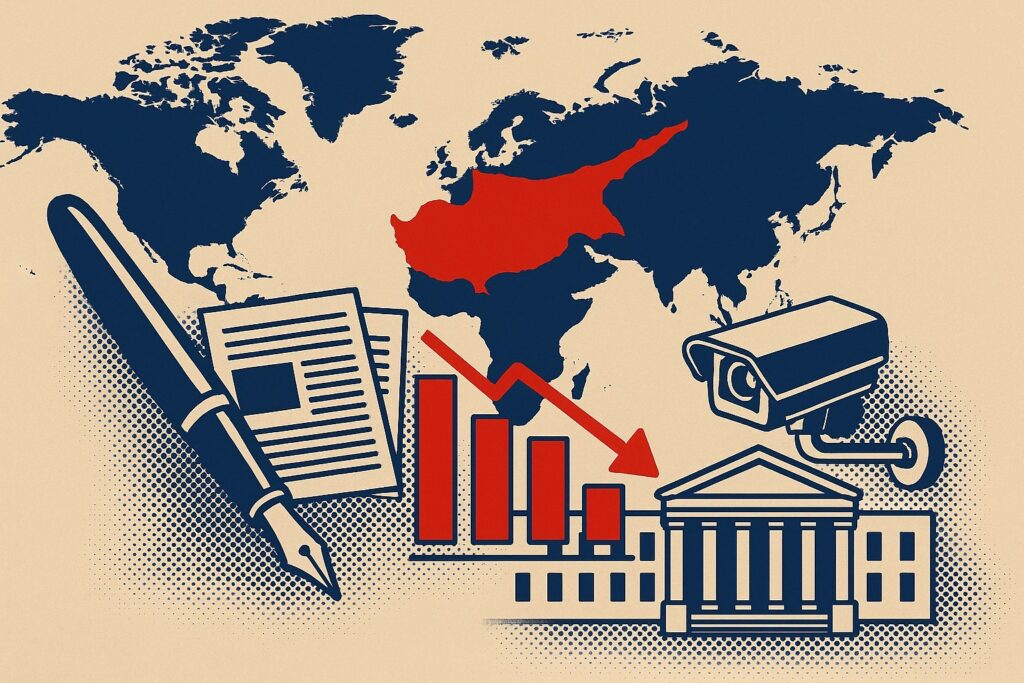Cyprus slips 12 places in the 2025 World Press Freedom Index by RSF. Cyprus now ranks 77th among 180 countries. Legislative attempts by the government that would undermine press freedom are causing concern. Turkey’s increasing pressure on the media and growing concentration in the hands of businessmen undermine press freedom in the north, writes Ciren.cy.
Cyprus has suffered a massive decline in the 2025 in the World Press Freedom Index amid concerns about recent legislative attempts by the government that would undermine freedom of the media.
According to the index published by the international non-profit organisation Reporters Without Borders (RSF) today, Cyprus has slipped 12 places to rank 77th among 180 countries in 2025. It ranked 65th in 2024.

In its country analysis for Cyprus, RSF described the influence of the government, the Church and business interests over the media as significant elements that “undermine media pluralism and push journalists towards self-censorship”. It raised concerns about “direct interference in editorial decisions through informal relationships between politicians and media owners, the growing media concentration and the lack of transparency in media ownership.”
On the legislative framework to protect media media freedom, RSF stated that the “mechanisms or procedures to protect journalists and prevent political interference are limited.”
However, the huge decline in ranking came amid recent attempts by the government to introduce legislation that would hamper press freedom.
The Cypriot government, last year prepared a legislative amendment that would put journalists in risk of prosecution and prison if their work is determined to be “fake news” by the attorney general, who is appointed by the president.
Escalating concerns about media freedom, CIReN revealed last month that through a new draft legislation, the Cypriot government will legalize spying on journalists with the aim of uncovering their sources.
The draft legislation, if approved, will allow for officials including the head of the secret service, police chief and “any other investigator or authorised official” to request from the attorney-general a court order that will require the journalists to reveal their sources. The bill also authorizes the attorney-general to request a court order mandating the surveillance including the use of spyware of journalists and their colleagues and close contacts to identify their sources.
Although the government says that the draft legislation was prepared as part of the obligation of EU member states to implement the European Media Freedom Act, there are widespread concerns among journalists and other stakeholders that the bill undermines the very principles that the EMFA aims to preserve.
“The pressure on Cypriot media – whose independence is weakened by their owners’ conflicts of interest – is not easing,” Pavol Szalai, who heads the EU-Balkans Desk at RSF told CIReN. “Attempts to undermine press freedom through legislation have continued in 2024 with the consideration of a draft law criminalizing the dissemination of fake news. This trend has stretched to this year as well: the draft law implementing the EMFA risks weakening the principle of confidentiality of journalistic sources, a cornerstone of media freedom.”
In its analysis, RSF raised concerns about the “dangerous proximity between the news media and those in power” in Cyprus. The problematic media ownership situation in Cyprus was highlighted by CIReN, which in a project titled ‘Who Owns the Media’ in September shed a light for the first time on how many media owners have other business interests or are directly involved in politics.
On the economic context, RSF underlined that the tight advertising market has made the media increasingly vulnerable to the influence of commercial interests, resulting in “increased private sector influence over editorial content.”
RSF also underlined that the Cypriot public broadcaster’s board of directors is appointed by the government for decades – a serious deficit on media pluralism, which has also been described in the annual Rule of Law reports by the European Commission.
Among other concerns listed by RSF are verbal attacks on journalists or media by politicians; civil libel lawsuits; and allegations of state surveillance and hacking into the devices and electronic files of journalist Makarios Droushiotis, who wrote a book about state corruption.
The long-standing political dispute in Cyprus also has a significant impact on how the media operates, according to RSF which stated: There is “a widespread sense of duty and loyalty to the government on the Cyprus issue. Reporters who question the official line are often labeled ‘traitors.’”
Northern part of Cyprus
The northern part of Cyprus dropped 1 place to rank 91st from 90 last year on the World Press Freedom Index.
In its analysis, RSF cited Turkey’s increasing pressure on the media and growing media concentration in the hands of businessmen among main factors undermining press freedom in the north.
RSF drew attention to the increased sanctions, libel lawsuits and criminal proceedings against journalists, especially those who criticize the Turkish or Turkish Cypriot government, military, or other authorities. It added that a growing number of journalists have been subjected to verbal attacks and harassment campaigns by Turkish and Turkish Cypriot authorities.

